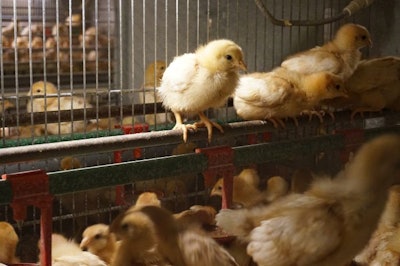
Eric Gingerich, DVM, technical services specialist with Diamond V, discussed findings from the 2020 Association of Veterinarians in Egg Production (AVEP) Annual Pullet and Layer Disease Survey.
"Starve-outs and yolk infections of chicks during the first week continue to be of moderate importance, indicating there is still work to be done in breeder hatch egg sanitation, hatchery and brooding management," Gingerich said.
Gingerich offers 6 reasons these issues may happen:
- The requirement to store hatch eggs for longer periods than desired to gain the large chick numbers required to fill our large houses can add to both starve-outs and yolk infections.
- Poor nest sanitation resulting in bacteria residing in the pores of the eggshell until hatching results in bacteria being released into the hatcher. This results in the bacteria invading chicks through the navel.
- Utilizing hatch eggs from breeders younger than 28 weeks of age (junior chicks) that are not as viable as chicks from older breeders can result in both starve-outs and yolk infections.
- These problems may also come from utilizing hatch eggs from breeders older than 70 weeks of age. "Chicks from these hatch eggs have more bacterial issues due to poor hatch eggshell quality," Gingerich said.
- Long chick transport times resulting in dehydration may result in the before mentioned health issues.
- Exposing chicks to a poor environment when placed may also contribute to these issues. Factors associated with an unideal environment include low humidity, low light intensity to find water, too low or high temperatures resulting in poor movement of chicks to water, chick papers not placed under water supply and poor water quality.
"The solutions to these issues are to correct the issue as best as one can," Gingerich concluded.

















